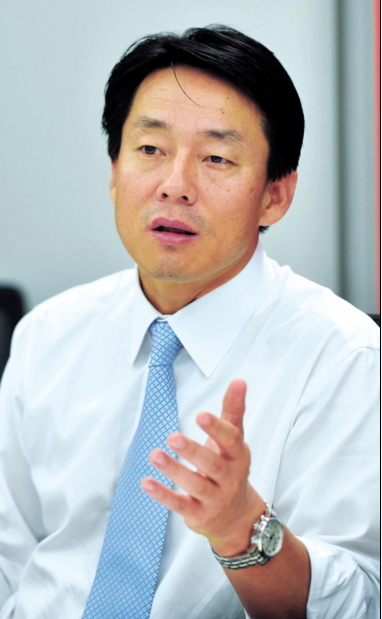Dell used to be known as a PC-and-laptop company. But in Korea, one of the most wired countries in the world, the company has successfully completed a transformation into a computing solution firm.
“We are now a stable and valuable member in the infrastructure and solution industry, and we have a significant stake in cloud computing, big data, data centers, and so on. Dell is now a part of all of this,” said Kim Kyeong-deog, president of Dell Korea.
Enterprise solutions and services are the top areas of Dell’s business. In laymen’s words, the company is mainly a provider of IT solutions, while also selling servers and data storage.
 |
Dell Korea president Kim Kyeong-deog speaks in an interview with The Korea Herald. (Kim Myung-sub/The Korea Herald) |
Kim is fairly new, having taken the Dell helm in February this year. But he is definitely no novice, with many years in solution sales under his belt: He is known for his tough but precise sales strategies.
“When our partners ask for more than they can sell, I make it a personal mission to make sure that there is a precise strategy in place because otherwise, it’s a losing situation for all of us,” the chief executive said.
His words were a stark contrast to norms of many other industries and companies in Korea, where firms are criticized for doing exactly the opposite and giving contractors more stock than they can handle.
Kim has a number of ambitious goals for Dell, but the prime objective is to earn the reputation as “the most respected IT company in the country.”
“This can be done. Our personnel adjustments are a part of this goal, and I believe we are close to that. We want to become a company that is not only financially strong, but has good people and creates a workplace where people want to stay,” the CEO said.
The company recently recruited a number of high-profile IT people from IBM and Cisco to join the team. They are from mainly marketing and service teams, reflecting Kim’s aspirations to strengthen those divisions.
Healthier internal relations are another area Kim is working on.
In the past, Dell Korea was known as a company with a high turnover rate, owing to its pressure for sales and less-than-healthy working environment.
But over the past few years, especially under Kim’s guidance, the culture has been changing.
Kim’s aides say he tries to forge closer ties with everyone in the organization, from top to bottom, mainly through lunches and dinners. He also utilizes various in-house groups, such as those created for volunteer work or CRS, to meet people and understand where they are coming from.
Through these multiple-faceted efforts, Kim hopes to triple sales over the next three years to reach 1 trillion won ($892 million) by 2015.
Another role Kim hopes Dell Korea will play is to lead the industry’s so-called “platform migration” involving the gradual metamorphosis into open-end platforms to help cut costs and create a better IT industry overall.
“Contrary to common belief, open-end platforms are the answer. They are not in any way a security risk. Rather, they contribute to cutting costs because the finances spent on maintenance can now be allotted for innovation,” the CEO said, citing how Samsung uses Amazon’s cheap, open-end platform for its applications.
He pointed out that globally, Dell was able to annually reduce costs by up to 20 billion won by completing its transition to open-end platforms. Previously, up to 60-70 percent of expenses were spent on maintenance.
Streamlining the sales channels was another goal Dell Korea has successfully achieved under Kim.
Further, the company is now expanding its provincial reach.
“In these regions, there are existing powers-that-be dominating the markets. Our goal is to strategically place our channels ― channels with really good long-term relationships with those entities to help gain larger footing,” Kim said.
He added that he sees major opportunities for Dell now that the government has put forth an “Information Communication Technology” initiative in the forefront of its IT policies.
Many in the foreign community including Dell also are looking forward to taking up a larger portion of the market now that the big names, such as Samsung SDS, are out of the picture following a government decision to get these companies to further expand abroad.
“We see many new opportunities for Dell Korea ― the platform migration, for one thing, and also because we are forging strong and close relationships both within and beyond the industry to make sure Dell Korea has long-term sustainability,” Kim said.
By Kim Ji-hyun (
jemmie@heraldcorp.com)








![[From the Scene] At this Starbucks, you need ID: Franchise opens store with view of North Korea](http://res.heraldm.com/phpwas/restmb_idxmake.php?idx=644&simg=/content/image/2024/11/29/20241129050068_0.jpg)